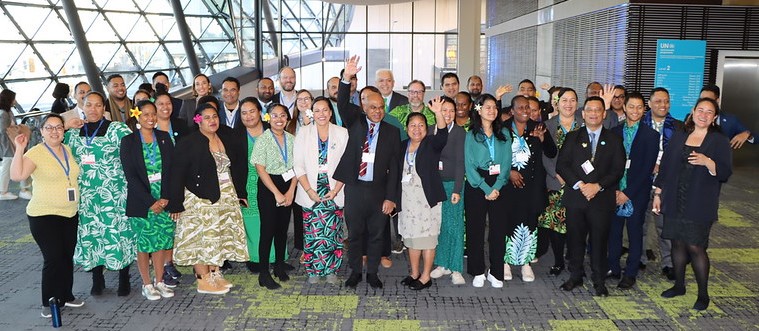
27 September 2024, Apia Samoa - The Secretariat of the Pacific Regional Environment Programme (SPREP) has signed the ‘Bridge to Busan’ Declaration on Primary Plastic Polymers, maintaining the Pacific’s push for a legally binding instrument on plastic pollution – including in the marine environment - that addresses the full lifecycle of plastics.
Launched at INC-4 in Ottawa Canada, the Bridge to Busan Declaration is an initiative by likeminded countries, led by the Federated States of Micronesia (FSM), to keep the intent of UNEA 5.2 Resolution5/14, especially the language on the production of plastics, in the draft text of the global plastics treaty.
As of 25 September 2024, more than 40 countries, including 7 SPREP members, have signed the declaration. Five Pacific Small Island Developing States (PSIDS) Cook Islands, FSM, Fiji, Solomon Islands, Vanuatu and two SPREP metropolitan members, Australia and France, are already signatories.
SPREP’s Director of Waste Management and Pollution Control (WMPC), Mr Anthony Talouli encourages other Pacific member states to sign up as momentum is building towards the fifth (and last planned) Intergovernmental Negotiating Committee (INC) in Busan, Republic of Korea, later this year.
“Plastic pollution has already impacted all of us at different levels. In the Pacific, despite contributing less than 1.3 per cent to global plastic pollution, our Pacific populations are disproportionately affected the crisis threatening livelihoods, health and economies,” Mr Talouli said.
“We are at a critical juncture in the negotiations process, and we are urgently seeking a strong global outcome for the benefit of our Pacific region.
“The Endorsement of the Bridge to Busan Declaration is viewed as a strategic move to ensure that calls for the treaty address the full lifecycle of plastics as per the mandate of the UNEA5.2 Resolution 5/14 and considers the already vulnerable circumstances of SIDS.”
Pacific Leaders during the recent 53rd Pacific Islands Forum Leaders Meeting in Tonga recommended the endorsement of the Bridge to Busan Declaration.
“Leaders supported the ongoing efforts of the Intergovernmental Negotiating Committee (INC) in developing an internationally legally binding instrument (ILBI) on plastic pollution, including in the marine environment,” the meeting’s Communique reads.
“Leaders supported these efforts further by ensuring that the Pacific region presents a unified and strong position and recommended endorsing the “Bridge to Busan: Declaration on Primary Plastic Polymers.”
The Leaders commitment to a legally binding instrument on plastics and a Cleaner Pacific is also highlighted in the Pacific Partnerships for Prosperity (PPFP), where one of the initiatives supports the Pacific’s journey towards a Global Plastics Treaty. The PPFP notes the Leaders’ concerns about the environmental, social, cultural, economic, health and food security impacts of plastic pollution.
The Bridge to Busan outcome from the 53rd PIF Leaders Meeting Communique was supported and endorsed during the recent Fourth SPREP Executive Board Meeting. The Bridge to Busan was also reflected in the outcomes statement of the Fourth Clean Pacific Roundtable held in Tuval in August.
According to the Declaration: “Studies show that the world cannot achieve its goals of ending plastic pollution and limiting global average temperature rise to less than 1.5° Celsius if the unsustainable production of primary plastic polymers is not addressed.”
Parties to the declaration therefore call on members to:
COMMIT to achieve sustainable levels of production of primary plastic polymers. This includes ensuring production matches ambitions for a circular economy for plastics, while aligning with the Paris Agreement goal of limiting warming to 1.5°C.
ENSURE transparency in the production of primary plastic polymers. This includes reporting of data on the production of primary plastic polymers to close information gaps, assess progress and inform priorities.
AGREE to a global objective regarding the sustainable production of primary plastic polymers. This may include production freezes at specified levels, production reductions against agreed baselines, or other agreed constraints to prevent the unsustainable production of primary plastic polymers.